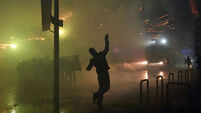Press intrusion ‘drove’ Rowling from her home
The Harry Potter author told the Leveson Inquiry into press standards she had been forced to take action against newspapers some 50 times over breaches of privacy and misreporting.
Explaining her vigorous attempts to protect her childrens’ privacy, she said she and her husband received phone calls from reporters trying to “blag” personal information.














